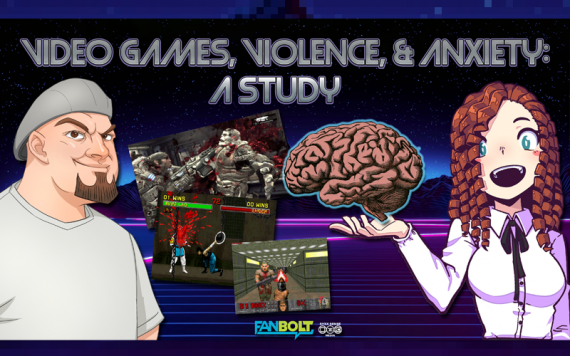Video Games, Violence, & Anxiety: A Study

I was a high school senior when Columbine happened in 1999. It did not take long for the scapegoat to be named by the news outlets: video games. A few days after the tragic events of April 20th, I asked my father if he thought that the media we consume could influence people to perform such violent acts. Years earlier, this same man had seriously curtailed what I could watch, excising MTV and other channels from my access.
“Some people are just more susceptible to these things. Maybe their parents didn’t pay attention to the cause and effect of it all.”
That opinion always stuck with me and echoed each and every time the mainstream media aimed their sites on the hobby of video games. Speculation, anecdotal evidence, and finger pointing has continued to this day, with very few with reach taking the time to look at the available research. If claims can be made that this form of entertainment could cause ill, could it also aid?
For the layman like myself, the task of decoding the mountain of research available on this topic feels insurmountable. Luckily, we have someone like Platinum Paragon who can disseminate everything for the blue collar person. Previously we talked to her about the ICD-11 classifications and featured her breakdown on who gamers are. This time, lets take a look at video games’ influence on violent behavior and anxiety.
In her article titled ‘Youth Violence and Video Games: A Data Analysis‘ the PhD student notes, “Research has been carried out to understand whether video games increase youth violence and aggression. However, this research has been criticised [sic] for relying on small samples of university students and using inaccurate measures of violence (such as giving someone a portion of hot sauce). When using more accurate measures of violence in a youth population, evidence shows that there are much larger social and environmental contributors to youth violence than video games.” Whether the selection of such a small group and the nebulous definition of “violence” is a purposefully used tactic to skew the results towards one outcome or the other is up to personal opinion, it shows that a more comprehensive study must be conducted before any stock should be put in the any talking head or “specialist” is paraded out by news outlets.
What about the medium’s effects those suffering from anxiety? Personally speaking, before I read Platinum’s findings, video games always became my relaxation time. During a very taxing day, where my level of anxiety would not dissipate upon returning home or working out, gaming had a noticeably positive effect for a short period.
I must concede, however, that my experiences cannot speak for everyone. So, when we look at the “How Video Games Can Help Anxiety” findings, “Games that demand our attention and concentration distract us from ruminating and allow us to engage in something fun. Instead of dwelling on your workload, your demanding boss or a rude customer, unwinding with a video game can keep us calm and distracted. Overcoming challenges and obstacles in a video game can also help boost your mood and keep you motivated…”
For more analysis by the author of these two articles, check out Platinum Paragon’s website.


Responses